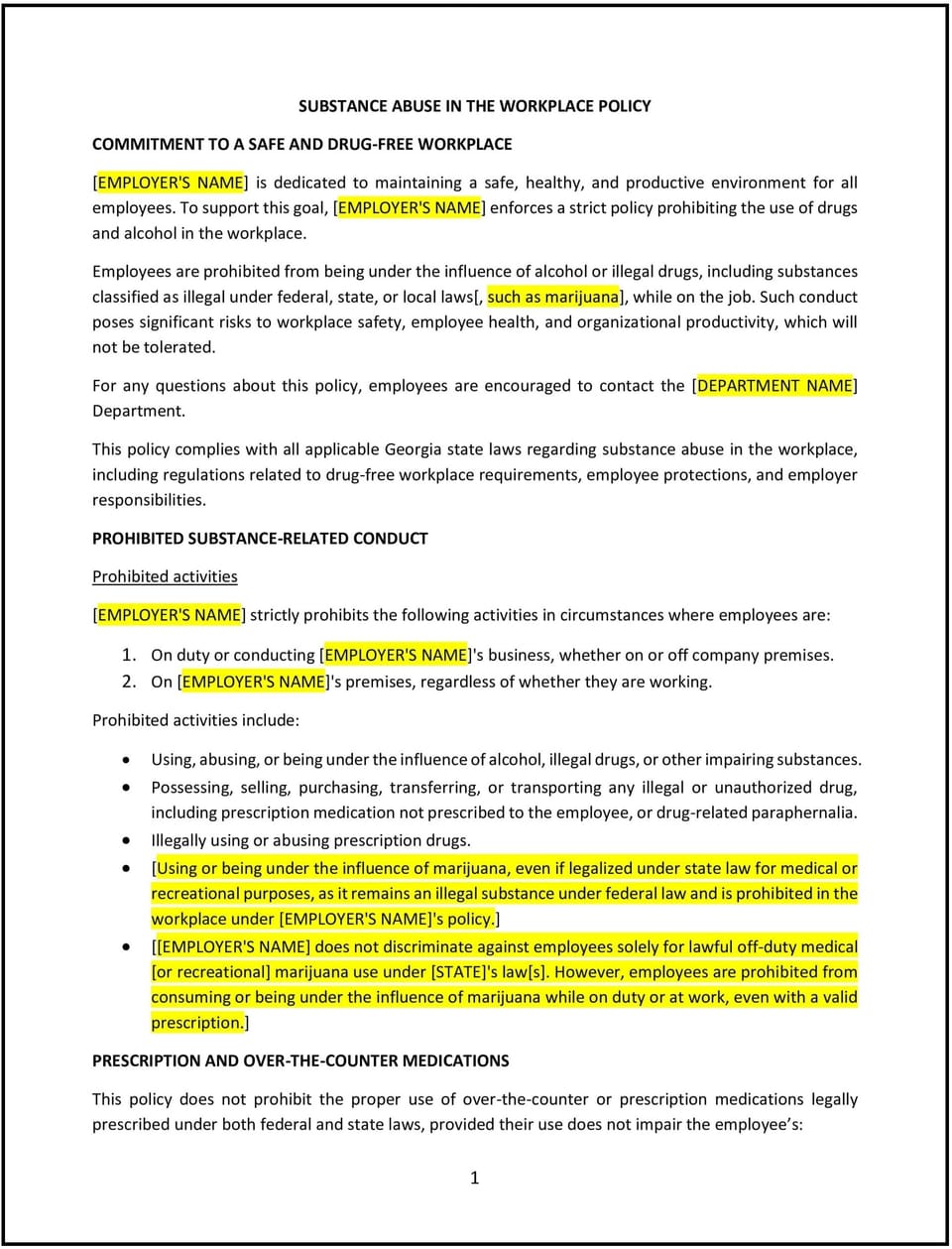Substance abuse in the workplace policy (Georgia): Free template

Substance abuse in the workplace policy (Georgia)
This substance abuse in the workplace policy is designed to help Georgia businesses maintain a safe, productive, and healthy work environment by addressing issues related to alcohol, drug, and substance use. The policy outlines prohibited behaviors, testing procedures, and support options for employees struggling with substance use.
By implementing this policy, businesses can promote safety, reduce risks, and support employees in overcoming substance-related challenges.
How to use this substance abuse in the workplace policy (Georgia)
- Define prohibited substances: Specify which substances are restricted, including illegal drugs, alcohol, and misuse of prescription medications.
- Establish testing procedures: Outline circumstances for drug or alcohol testing, such as pre-employment, random testing, or post-incident testing.
- Prohibit substance use: Clearly state that substance use, possession, or impairment during work hours or on company property is prohibited.
- Provide resources: Offer access to employee assistance programs (EAPs), counseling, or rehabilitation services for employees in need.
- Address reporting: Encourage employees to report substance-related concerns, such as unsafe behavior or suspected violations, through confidential channels.
- Include disciplinary actions: Detail the consequences of policy violations, ranging from warnings to termination, depending on the severity of the offense.
- Protect confidentiality: Ensure that employee testing results and related information are handled discreetly and shared only as necessary.
- Review and update regularly: Periodically assess the policy to reflect changes in Georgia workplace practices, state laws, or organizational needs.
Benefits of using this substance abuse in the workplace policy (Georgia)
Implementing this policy provides several advantages for Georgia businesses:
- Promotes safety: Reduces the risk of accidents or injuries related to substance use in the workplace.
- Enhances productivity: Addresses substance-related performance issues effectively and promptly.
- Supports employee health: Provides resources for employees struggling with substance abuse, fostering a supportive environment.
- Reduces liability: Clear guidelines and testing procedures help businesses manage risks associated with substance-related incidents.
- Reflects Georgia-specific practices: Tailoring the policy to local regulations and workplace culture ensures relevance and effectiveness.
Tips for using this substance abuse in the workplace policy (Georgia)
- Communicate the policy: Share the policy with employees during onboarding and provide regular reminders.
- Provide training: Educate managers and employees on recognizing and addressing substance abuse issues in the workplace.
- Use third-party testing: Partner with certified testing providers to ensure accuracy and consistency in drug and alcohol testing.
- Encourage open dialogue: Create a nonjudgmental environment where employees feel comfortable seeking help or reporting concerns.
- Monitor effectiveness: Collect feedback and evaluate the policy’s impact to make improvements as needed.
Q: What substances are prohibited under this policy?
A: Prohibited substances typically include illegal drugs, alcohol, and misuse of prescription or over-the-counter medications.
Q: When can businesses require drug or alcohol testing?
A: Businesses may conduct testing during pre-employment, randomly, post-incident, or when reasonable suspicion arises, as outlined in the policy.
Q: How should businesses address employees struggling with substance abuse?
A: Businesses should provide access to resources such as employee assistance programs, counseling, or referrals to rehabilitation services.
Q: What should businesses do if an employee violates the policy?
A: Businesses should follow established disciplinary procedures, which may include warnings, suspension, or termination, depending on the severity of the violation.
Q: How should businesses ensure confidentiality in testing?
A: Businesses should handle testing results and related information discreetly, sharing them only with authorized personnel as necessary.
Q: Can businesses prohibit alcohol at work-sponsored events?
A: Yes, businesses should specify in the policy whether alcohol is allowed at work-sponsored events and outline any related expectations.
Q: How often should this policy be reviewed?
A: The policy should be reviewed annually or as needed to reflect changes in Georgia workplace practices, state laws, or employee feedback.
This article contains general legal information and does not contain legal advice. Cobrief is not a law firm or a substitute for an attorney or law firm. The law is complex and changes often. For legal advice, please ask a lawyer.


